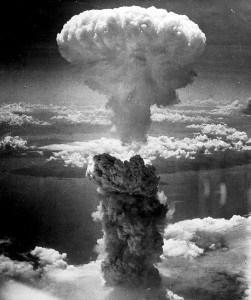
When the United States dropped atomic bombs on Hiroshima and Nagasaki in August, 1945, it set off a fierce debate. At least a hundred thousand civilians were killed and the cities had been leveled to the ground. A new era had begun where one bomb could destroy vast numbers of civilians. Many questions were raised, which are still debated to this day. Was it right to intentionally make war on civilians? Were the bombings justified because of thousands of American soldiers who would have likely been killed in the alternative – an invasion of Japan? Thousands of pages have been written on these issues, but we will add a few lines of our thoughts.
Historical Context
When considering the morality of dropping the atomic bombs, we need to consider the historical context in which this took place. These were not isolated acts. In fact, the Allies had been targeting civilians for years. Strategic bombing targeted not just factories and infrastructure necessary for the enemy’s war effort, but intentionally used weapons to try to demoralized the enemy public. Many hundreds of thousands of people were killed in these raids. Incendiary firebombs were dropped on Japan to intentionally light the wooden buildings on fire. The people suffered untold suffering as their cities burned, the fire raging hot enough to melt the asphalt in the streets. 75,000 – 200,000 people were killed in the firebombing of Tokyo, more than either atomic bomb. If we condemn the use of the atomic bomb, we must also condemn thousands of other bombings of civilians and the entire strategy of the Allied air force.
When the war began, the Allies did not plan to bomb civilians. President Franklin Delano Roosevelt appealed to the combatants to “under no circumstances undertake bombardment from the air of civilian populations in unfortified cities,”i and at first all sides agreed. This commitment soon fell apart. Both sides committed a series of escalating reprisals. Eventually all sides decided to intentionally target the civilian population, to try to break their will to fight. A British staff paper said,
The ultimate aim of an attack on a town area is to break the morale of the population which occupies it. To ensure this, we must achieve two things: first, we must make the town physically uninhabitable and, secondly, we must make the people conscious of constant personal danger.ii
When the United States entered the war they, like the other powers had when the war began, planned to use only precision bombing. They wished to only hit military targets, and avoid damage to the civilians as much as possible. Although the military would continue to insist that that is what they were doing, that was not, in fact, the case. German anti-aircraft fire was very damaging, and it hindered Allied plans. Some bombing runs were conducted at night, which made attempts to hit the target guesswork at best, given the rudimentary navigation equipment. Even if conducted during the day, few bombs hit their target. One survey found that only 20% of bombs came within 1000 yards of their target. The reality was that if a “precision bombing” was ordered on a target anywhere near civilians, they had about the same chance of hitting the civilians as of hitting the target.
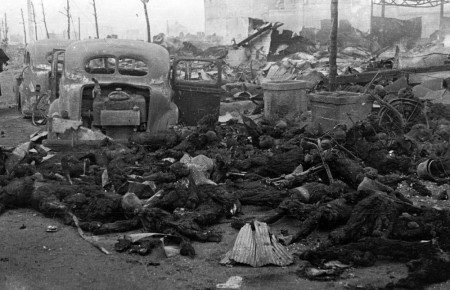
Law
There were no international laws which clearly prohibited the aerial bombardment of civilians. The Hague Conventions took place in 1899 and 1907 – before aerial attacks were something to even consider. The Hague Rules of Air Warfare were written in 1927, but nations never agreed to abide by them. When the war was over, and the Axis leaders were being tried for war crimes in the Tokyo and Nuremburg Trials, they were not prosecuted for bombing civilians. The Allies could not do that without appearing as hypocrites before the world.
Leo Szilard was one of the scientists involved in creating the atom bomb at the Manhattan project, but he argued against its use against civilians:
Suppose Germany had developed two bombs before we had any bombs. And suppose Germany had dropped one bomb, say, on Rochester and the other on Buffalo, and then having run out of bombs she would have lost the war. Can anyone doubt that we would then have defined the dropping of atomic bombs on cities as a war crime, and that we would have sentenced the Germans who were guilty of this crime to death at Nuremberg and hanged them?iii
Without a doubt, if by some miracle the Japanese had won the war after the bombing of Hiroshima and Nagasaki, the Americans would have been charged and convicted with war crimes.
What About the Bible?
A major issue with the Allies decisions were that they were backed up by pragmatic reasoning. They weren’t making them off of a consistent moral standard, they were just trying to achieve victory in the way they saw as the easiest, only constrained by what they felt their conscience said was right and wrong. Thus wiping Hiroshima and Nagasaki off the map could be justified by arguing that if they had instead landed on Japan, more Americans, and also Japanese, would have been killed. However, no one knows the future. Pragmatism ultimately does not work. It was pragmatic reasoning that led the British to try to appease Nazi Germany in the 1930s instead of standing up to their evil. The proper course is to do what is right, even if it doesn’t seem the best way to our reasoning. As the old saying goes, duty is ours, results are God’s.
Using the Bible as our moral standard, was dropping the atomic bomb right or wrong? In Deuteronomy 20, God gave Israel strict instructions on how to conduct warfare. He says:
When thou comest nigh unto a city to fight against it, then proclaim peace unto it. And it shall be, if it make thee answer of peace, and open unto thee, then it shall be, that all the people that is found therein shall be tributaries unto thee, and they shall serve thee. And if it will make no peace with thee, but will make war against thee, then thou shalt besiege it: and when the Lord thy God hath delivered it into thine hands, thou shalt smite every male thereof with the edge of the sword: but the women, and the little ones, and the cattle, and all that is in the city, even all the spoil thereof, shalt thou take unto thyself; and thou shalt eat the spoil of thine enemies, which the Lord thy God hath given thee.iv
Israel was instructed offer cities the option of surrender, and if they refused, only the men were to be killed. The women and children were to be spared. But there was little or no warning given to Hiroshima and Nagasaki, and the bombs indiscriminately killed men, women and children alike. Deuteronomy 20 goes on further:
When thou shalt besiege a city a long time, in making war against it to take it, thou shalt not destroy the trees thereof by forcing an axe against them: for thou mayest eat of them, and thou shalt not cut them down (for the tree of the field is man’s life) to employ them in the siege:v
The Israelites were not to cut down trees to so as not to destroy the productivity of the land. Atomic bombs dropped on cities do the exact opposite – they destroy everything in their path fruit trees, women and children. Under Biblical law, there is no question that they would be forbidden.
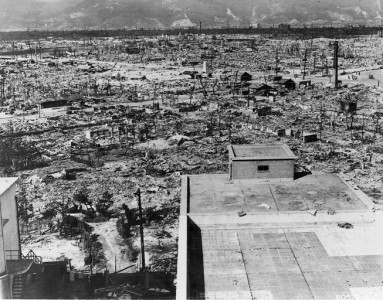
Further Study
Logical Insanity by Dan Carlin
Restricted Data: The Nuclear Secrecy Blog
Footnotes
i. Appeal of President Franklin D. Roosevelt on Aerial Bombardment of Civilian Populations, September 1, 1939
ii. Despatch on war operations, 23rd February, 1942, to 8th May, 1945 by Arthur Travers Harris (1995) Cass Series: Studies in Air Power. 3. Psychology Press. p. 7.
iii. “President Truman Did Not Understand,” U.S. News & World Report, August 15, 1960, pages 68-71.
iv. Deuteronomy 20:10-14
v. Deuteronomy 20:19



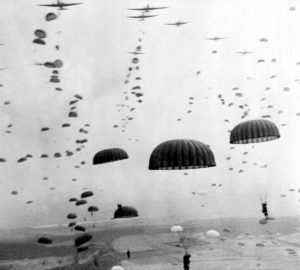
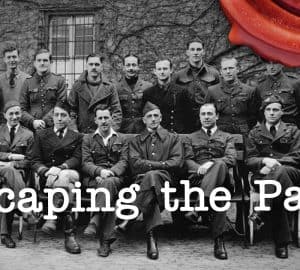
It’s good to me for my knowledge
and I am thankfull to the creator.
There is a major typo in the first sentence of this post. The bombs were dropped in 1945, not 1845.
Thanks for point that out!
is it a war crime or not?
Of course its a war crime! Americans try to wash it off with saying “we saved more lives and ended the war” who cares? You murdered innocent people TWO TIMES! Nobody ever in history used nuclear bomb against humanity only you.
I love how you just assume all Americans defend it. No, trust me, most of us are pretty disgusted with it too. That being said, the worst part wasn’t so much that we used nuclear bombs, but the fact that we *murdered civilians* who aren’t even taking part in the war. That’s just completely inexcusable from *any* side. The fact that we turned the two cities into irradiated wastelands is just the frosting on the war crime cake.
I’m an American and I think it is a war crime even if the the Nationalists think it was not. It’s our history books in school that white wash it and only paint Japan as the aggressing nation. The Japanese were about to surrender but Truman didn’t agree to the condition that the emperor would not be harmed or executed in the surrender. Of course the Japanese kept fighting as they probably assumed that America would invade the capitol to assassinate the emperor or drop a bomb on the capitol if they surrender. Seven of the United States’ eight five-star Army and Navy officers in 1945 agreed with the Navy’s vitriolic assessment. Generals Dwight Eisenhower, Douglas MacArthur and Henry ‘Hap’ Arnold and Admirals William Leahy, Chester Nimitz, Ernest King, and William Halsey are on record stating that the atomic bombs were either militarily unnecessary, morally reprehensible, or both. http://www.ronpaulinstitute.org/archives/featured-articles/2020/august/06/truman-s-war-crimes-at-hiroshima-and-nagasaki/
Read (BLA, have some read it to you, since your to stupid to be able to read) D.M. Giangreco’s “Hell to Pay: Operation Downfall and the Invasion of Japan, 1945-1947.” An invasion of the main islands was the alternative. It likely would have failed, pushing the for several more years and probably tens of millions more dead.
Completely disagree with you on this point, during the times that the bombs were dropped Japan was nearing defeat it’s possible they would have surrendered if not there may have been more deaths but unlikely in the millions. In any case these were soldiers this is their duty and what they sign up for. It’s very noble of them but to drop bombs on civilians is not.
Don’t invade Japan, Just blockade them, and if the Russans want to, then let them.
All I can say from experience is that the vast majority of self-appointed judges of the morality of the atomic bombings would, if endangered by a foreign enemy themselves, take less time to ponder the use of such weapons than did the decision makers in the U.S. during WWII. The same would apply to the allied bombings of Germany…which in every case were retaliatory and necessary to end the war. The atomic bombings, though terrible, did save the lives of hundreds of thousands if not millions of people…and of a large percentage of the allied troops that would have taken part in landings on the Japanese islands. The author makes a terrible error in his reading of the bible: women and children were not “spared”, they were properties to be taken by the victors, as were the trees mentioned. Biblical warriors, just as Koranic ones today, considered women and children prizes to be taken by force, not at all as human beings to be spared. Misconstruing the bible is an easy thing to do, and one should take a great deal of care not to do so. Any good person regrets that the U.S. had to use the atomic weapons in 1945. And any good and intelligent person is full of admiration for America, Great Britain, Russia, and France for NOT using them again. Again, the world is fortunate that many who criticize the bombings were not the caretakers of nuclear weapons at any time in history; we might have far more to lament.
While you are right that the women and children would the taken captive by the victors, that in no way means that they were not considered human beings. The Old Testament clearly says that all humans, men, women and children, are created in the image of God (Gen 1:27).
It is indeed far easier to make decisions over the use of atomic weapons as an armchair general. But when the time comes we need people to make the real decisions using a consistent and correct moral framework, not by impromptu pragmatism.
Incorrect mate. How is it that you know what other countries or people that judge the americans would do or how quick they would take to decide. This was a war crime, not justifiable in any sense. I too am religious that’s why such destruction saddens me. The US was not in immediate threat from Japan, the Japanese were close to defeat.
It is indeed very easy to make armchair decisions as a self-styled intellectual and moralist. Pragmatism my friend is a far better approach to solving the ethical dilemmas and social problems of our time than quoting passages from a bible as far apart in context as Genesis and Deuteronomy.
But this is what you are saying: The U.S. decision makers have a horrible weapon capable of ending Japanese resistence without further loss of soldiers lives. They must not use it ! Why? Because you think it is far more “moral” to send hundreds of thousands of young Americans and Britons (mostly boys of 18-23) to die on fortified beaches attempting to kill an even greater number of young and old Japanese soldiers than it is to order the death of a great number (though still far smaller number) of Japanese citizens in two major cities. Well, I think enough young men had been sacrificed already…the units reserved to attack the Japanese islands had already suffered and bled during two or three years against a brave and resolute enemy (and very human too as men who fought them have told me personally) which had suffered still more. And for what? For your safety…and apparently for your comfortable existence. Often it is far from fun, it is indeed very painful, but often people must face REALITY, and that is what was done, as well as could be done, in 1945.
The worst result (besides the collateral damage) of nuking of Hiroshima and Nagasaki is that it started the building of more nuclear bombs and the US’s ridiculously dangerous redundance of tens of thousands of weapons. I realize it is too late to cry about it, but inventing such a destructive weapon opened a Pandora’s box. Nothing can be more regrettable in my opinion. This planet is all we have. It wouldn’t take many H-bombs to pollute the earth. In addition to mass immolation of many lands we will all be breathing in radioactive materials. Why do so many people defend the US having so many weapons and wanting to be the only country to keep them all? To deter? No. Anything said here will be taken as political because everyone else will jump on it like a murder of crows.
Killing innocent people is wrong no matter how you slice it. There is no excuse. None.
correct
as you say inocent, children not soilders. who did sign up for it
Dont worry, the same brutality will be visited on al Americans using these exampmes of mass murder as the justification.
And good riddance to all you situational wthocists who swallowed the usury banking propaganda swill used to justify the mass murders of tens of millions of French, German, and Japanese women and chldren.
When it is finally your turn under screw, no obe will shed a tear.
There is no question this was a war crime Japan was about to surrender but The United States dropped the bomb anyways. Japan wanted the US to agree not to execute or harm the emperor and Truman did not agree to that and wanted unconditional surrender. There was absolutely no reason for us to not accept the surrender and instead drop a bomb, http://www.ronpaulinstitute.org/archives/featured-articles/2020/august/06/truman-s-war-crimes-at-hiroshima-and-nagasaki/
It’s definitely a WAR CRIME, a GENOCIDE… And I just hope that one day they would accept that fact that it is, and hope they’d somehow apologize to the remaining families of the victim.
Droping the bomb on a milatary base was an option they decided not to go with